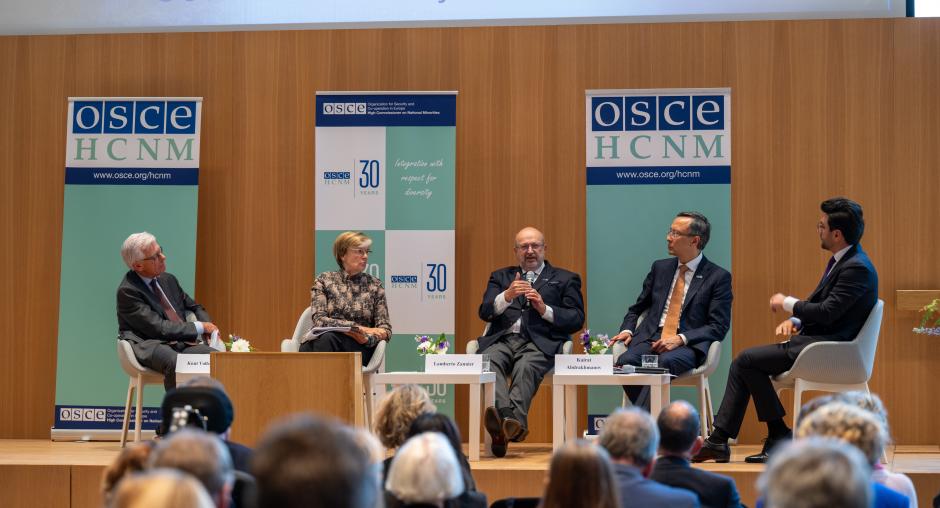OSCE celebrates 30th anniversary of High Commissioner on National Minorities

THE HAGUE, 24 October 2023 – The institution of the OSCE High Commissioner on National Minorities (HCNM) marked its 30th anniversary today with a high-level conference at the Peace Palace in The Hague. At the event, High Commissioner Kairat Abdrakhmanov also presented new recommendations on the effective participation of national minorities in social and economic life.
“On this special anniversary we have a lot to be thankful for, and even more to reflect on. Today, we look to the past with the lens of the present so we can shape a future in which every national minority group can thrive and be empowered in a society that is rich in diversity, equity and inclusion,” said OSCE High Commissioner on National Minorities Kairat Abdrakhmanov.
“As the motto of our Chairpersonship is ‘It’s about People’, indeed, our organization is about people. About granting people safe, secure and dignified lives through words and actions and agreements delivered through fora designed and ready for that very purpose, as showcased by the High Commissioner on National Minorities. What the HCNM has proven over time, is that the OSCE as a whole can address complex issues and address contemporary issues and needs,” said the OSCE Chairman-in-Office, Foreign Minister of North Macedonia Bujar Osmani. “The HCNM has a unique mandate focused on quiet, preventive diplomacy alongside building peaceful and resilient societies through strengthened social and inter-ethnic cohesion.”
“The High Commissioner’s quiet and preventive diplomacy is a vital asset for the OSCE that has led to tangible results all over the OSCE region in safeguarding minority rights and improving social cohesion. I am particularly proud of the work we do to address limited access to social services, education and the legal system or to support minority women who are often disproportionally affected by conflict,” said OSCE Secretary General Helga Maria Schmid.
“As the OSCE region and the world globally watches inter-ethnic tensions develop into conflicts that could have been prevented, 30 years of HCNM early warning and early action offers lessons that need to be learned. This unique instrument that combines security, politics and rights shows us that sustainable peace, stability and development depend on a human rights-based approach, specifically including minority rights, to identify and address legitimate grievances and reach solutions that benefit society as a whole. We urgently need to find the multilateral political support, leadership and financial investment for that ounce of prevention that will address conflicts before they break out,” said UN Assistant Secretary-General for Human Rights Ilze Brands Kehris.
In a panel on “Lessons learned, present perspectives and future application of the mandate”, reflecting on 30 years of the HCNM, the former and present High Commissioners discussed the work of the institution and how they carried out their mandate. They drew attention to the accumulated experience of the institution and the significance of the thematic work, including the institution’s evolving approach to gender-related issues. Speakers also shared their thoughts on the role of the HCNM within the changing security landscape. Other speakers focused on the important role played by national minorities in the daily life of participating states.
Two further panels were dedicated to presenting the Recommendations on the Effective Participation of National Minorities in Social and Economic Life. In the first panel, the experts presented key principles from the Recommendations. In the second panel, a group of experts discussed the practical implications and good practices related to promoting the effective participation of national minorities in social and economic life.
With this publication, the HCNM highlights the connection between conflict prevention, national minorities, and social and economic inclusion, and offers practical tools to facilitate social and economic participation at different levels and in various settings based on the experience of the successive High Commissioners.
The inclusion of national minorities in economic and social life is a crucial element of democracy, particularly in multi-ethnic societies, as it fosters unity and breaks down societal divisions. The Socio-Economic Recommendations also offer suggestions on how policymakers can bridge the gap in the realization of social and economic rights for minority women, youth and the elderly.
“OSCE participating States have everything to gain from the greater involvement of national minorities in social and economic life. If minorities remain under-educated, underpaid and under-employed because of discrimination or hindered access, whether intentional or not, the economy of the entire country or region may suffer, with possible adverse consequences for members of the majority and neighbouring countries as well. When persons belonging to national minorities feel marginalized and trapped in poverty, they may feel resentment of the authorities or of the majority, which in turn can give rise to conflict,” said Abdrakhmanov.
National minorities frequently find themselves at a disadvantage in various areas of economic and social life. Certain minority groups – such as Roma, Sinti, Travellers or indigenous peoples – are often at an even higher risk of exclusion from social and economic life. The Socio-Economic Recommendations propose approaches that participating States can follow to overcome these obstacles, as well as issues related to gender, youth and the elderly. They also highlight the emerging challenges posed by the digital divide and environmental justice.
